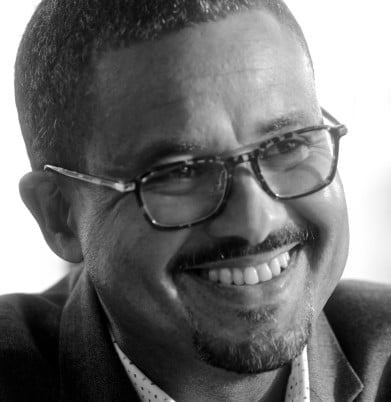
David Diop
- France, Senegal
- Zu Gast beim ilb: 2019
The French-Senegalese writer and literary scholar David Diop was born in Paris in 1966 and grew up in Senegal. He returned to France for university, obtained his doctorate at the Sorbonne on 18th-century French literature and in 1998 took on a teaching post at the University of Pau in the field of his doctorate as well as in French-language African literature. In 2009, Diop also became head of a research group on European representations of Africa and Africans in the 17th and 18th centuries. Diop earned his university teaching qualification (habilitation) in 2014.
Diop has written two novels to date. He made his debut in 2012 with »1889, lʼattraction universelle« (tr: 1889, the Universal Attraction). The story tells of the trip of an eleven-member delegation from Senegal to the 1889 World’s Fair in Paris. In a small circus in Bordeaux, the director wants them to be introduced as blacks, but the spectacle takes an unexpected course. Diop’s second novel »Frère d’âme« (2018, tr: Soul Brother) attracted even more attention from French literary critics. Diop himself also described it as his »first real novel«. In it, he addresses a forgotten historical fact: During World War I, recruits from the colonies fought in the ranks of the French army. Around 200,000 soldiers were drafted from Senegal alone. The protagonists of »Frère d’âme«, whose title recalls the phrase »brothers in arms« (»frères d’armes« in French), are two Senegalese friends named Alfa Ndiaye and Mademba Diop, who fight German soldiers as snipers. Mademba falls on the battlefield, Alfa loses his mind and cuts off the hands of the defeated German soldiers to take them away as spoils of war. In doing so, he increasingly frightens his French comrades. In his anti-war novel, Diop does not spare the reader brutal descriptions of the devastation of the bodies and souls of the soldiers. Another major theme of the novel is the clan structure of Senegalese society from one hundred years ago. Diop pays particular attention to the language of the protagonists, who have been influenced by a culture of spoken word. For him, it was a personal matter to lend a voice to those people who had not previously appeared in literature. In addition, Diop’s novel creates a highly literary and disturbing fable about human existence that transcends all genre boundaries. »Temporary madness is the sister of courage in war … at night, all blood is black.«
The novel was shortlisted for the four major French literary prizes Prix Goncourt, Prix Renaudot, Prix Femina, and Prix Médicis, and was awarded the Prix Goncourt des lycéens in 2018. The author lives in Pau.
1889, lʼattraction universelle
LʼHarmattan
Paris, 2012
Nachts ist unser Blut schwarz
Aufbau
Berlin, 2019
[Ü: Andreas Jandl]
